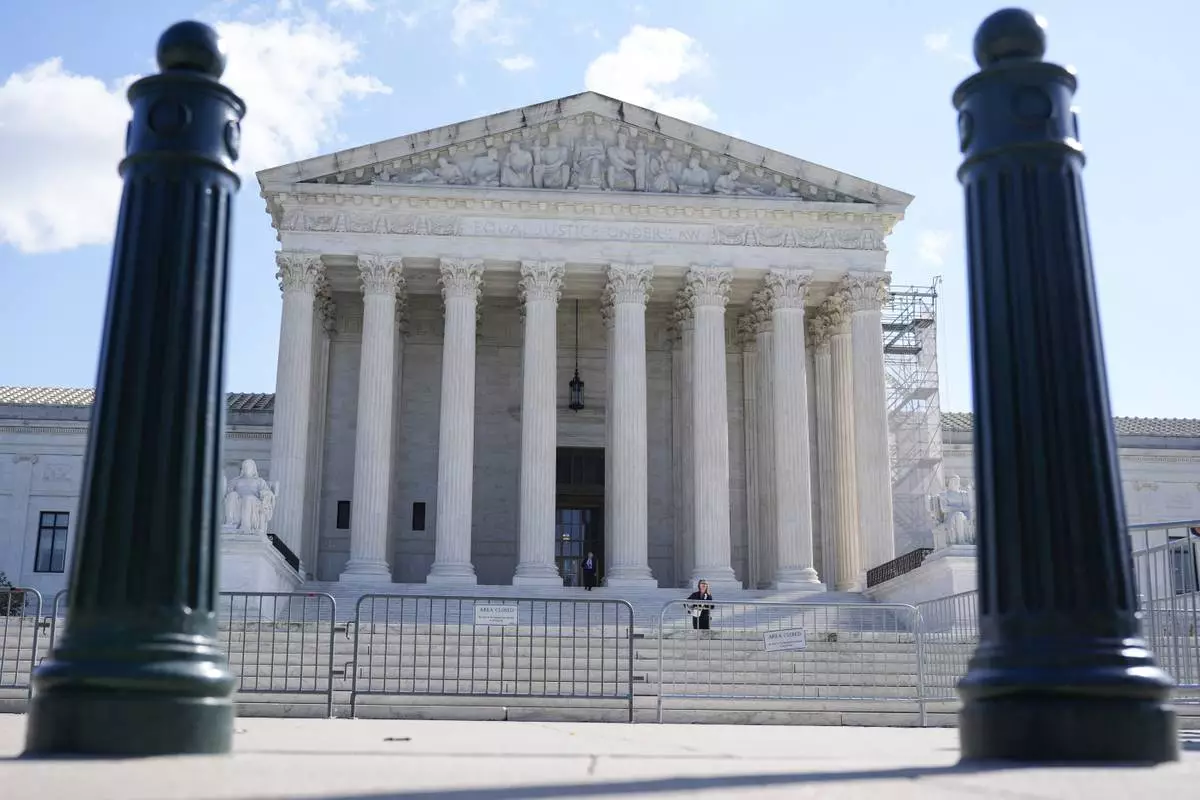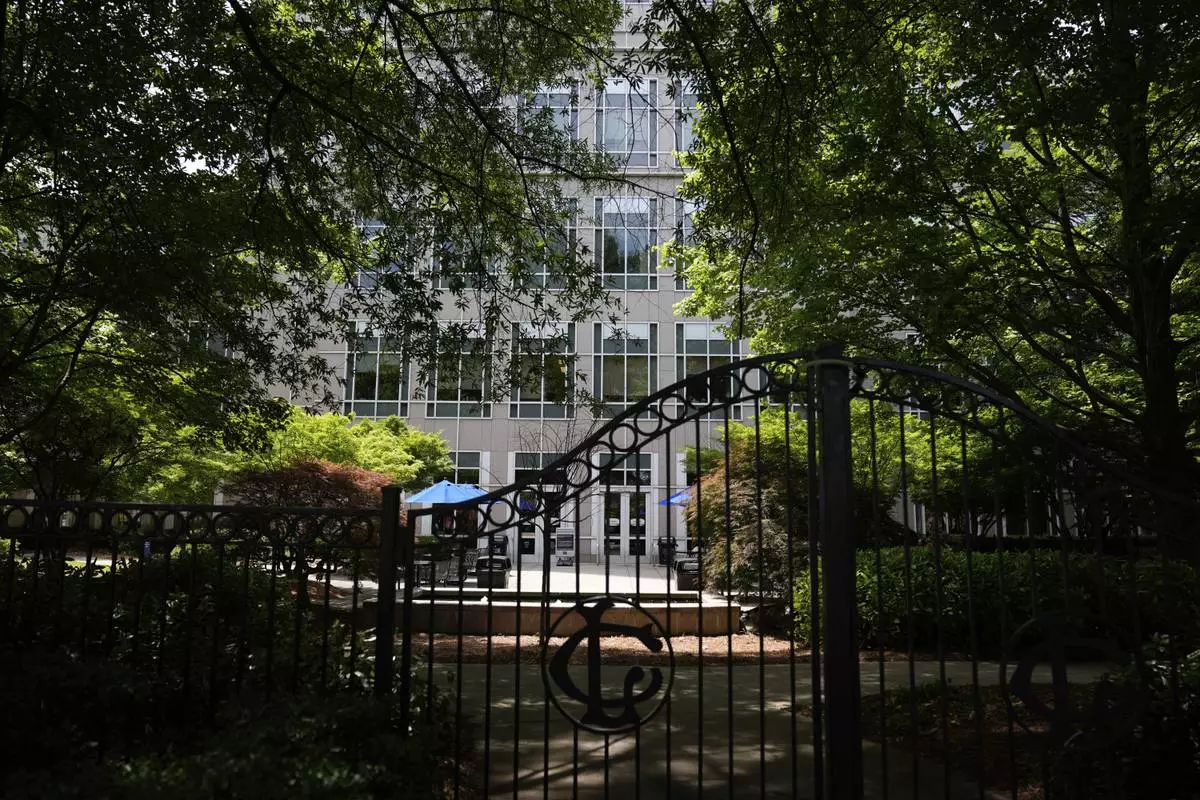WASHINGTON (AP) — Chief Justice John Roberts issued a defense Tuesday of judicial independence, which he said is under threat from intimidation, disinformation and the prospect of public officials defying court orders.
Roberts laid out his concerns in his annual report on the federal judiciary. It was released after a year where the nation's court system was unusually enmeshed in a closely fought presidential race, with then-Republican presidential candidate Donald Trump assailing the integrity of judges who ruled against him as he faced criminal charges for which he denied wrongdoing.
Trump won the race following a landmark Supreme Court immunity decision penned by Roberts that, along with another high court decision halting efforts to disqualify him from the ballot, removed obstacles to his election.
The immunity decision was criticized by Democrats like President Joe Biden, who later called for term limits and an enforceable ethics code following criticism over undisclosed trips and gifts from wealthy benefactors to some justices.
Roberts, for his part, introduced his letter by recounting a story about King George III stripping colonial judges of lifetime appointments, an order that was “not well received.”
Trump is now readying for a second term as president with an ambitious conservative agenda, elements of which are likely to be legally challenged and end up before the court whose conservative majority includes three justices appointed by Trump during his first term.
Roberts and Trump clashed in 2018 when the chief justice rebuked the president for denouncing a judge who rejected his migrant asylum policy as an “Obama judge.”
In 2020, Roberts criticized comments made by Senate Democratic leader Chuck Schumer while the Supreme Court was considering a high-profile abortion case.
Roberts didn't mention Trump, Biden or any other specific leader in this year's annual report. Instead, he wrote generally that even if court decisions are unpopular or mark a defeat for a presidential administration, other branches of government must be willing to enforce them to ensure the rule of law.
He pointed to the Brown v. Board of Education decision that desegregated schools in 1954 as one that needed federal enforcement in the face of resistance from southern governors.
“It is not in the nature of judicial work to make everyone happy,” he wrote.
The chief justice also decried elected officials across the political spectrum who have “raised the specter of open disregard for federal court rulings.”
“Attempts to intimidate judges for their rulings in cases are inappropriate and should be vigorously opposed,” he wrote.
While public officials and others have the right to criticize rulings, they should also be aware that their statements can “prompt dangerous reactions by others.”
Threats targeting federal judges have more than tripled over the last decade, according to U.S. Marshals Service statistics. State court judges in Wisconsin and Maryland were killed at their homes in 2022 and 2023, Roberts wrote.
“Violence, intimidation, and defiance directed at judges because of their work undermine our Republic, and are wholly unacceptable,” he wrote.
Roberts also pointed to disinformation about court rulings as a threat to judges’ independence, saying that social media can magnify distortions and even be exploited by “hostile foreign state actors” to exacerbate divisions.
Against a backdrop of those heightened divisions, Americans’ confidence in the country’s judicial system and courts has dropped to a record low of 35%, a Gallup poll found.

FILE - The Supreme Court is pictured, Oct. 7, 2024, in Washington. (AP Photo/Mariam Zuhaib, File)
ATLANTA (AP) — A pregnant woman in Georgia was declared brain-dead after a medical emergency and doctors have kept her on life support for three months so far to allow enough time for the baby to be born and comply with Georgia’s strict anti-abortion law, family members say.
She could be kept in that state for months more.
The case is the latest consequence of abortion bans introduced in some states since the Supreme Court overturned Roe v. Wade three years ago.
Adriana Smith, a 30-year-old mother and nurse, was declared brain-dead — meaning she is legally dead — in February, her mother, April Newkirk, told Atlanta TV station WXIA.
Newkirk said her daughter had intense headaches more than three months ago and went to Atlanta's Northside Hospital, where she received medication and was released. The next morning, her boyfriend woke to her gasping for air and called 911. Emory University Hospital determined she had blood clots in her brain and she was declared brain-dead.
Newkirk said Smith is now 21 weeks pregnant. Removing breathing tubes and other life-saving devices would likely kill the fetus.
Northside did not respond to a request for comment Thursday. Emory Healthcare said it could not comment on an individual case because of privacy rules, but released a statement saying it “uses consensus from clinical experts, medical literature, and legal guidance to support our providers as they make individualized treatment recommendations in compliance with Georgia’s abortion laws and all other applicable laws. Our top priorities continue to be the safety and wellbeing of the patients we serve.”
Smith's family says Emory doctors have told them they are not allowed to stop or remove the devices that are keeping her breathing because state law bans abortion after cardiac activity can be detected — generally around six weeks into pregnancy.
The law was adopted in 2019 but not enforced until after Roe v. Wade was overturned in the 2022 Dobbs v. Jackson Women’s Health Organization ruling, opening the door to state abortion bans. Twelve states are enforcing bans on abortion at all stages of pregnancy and three others have bans like Georgia's that kick in after about six weeks.
Like the others, Georgia's ban includes an exception if an abortion is necessary to maintain the woman's life. Those exceptions have been at the heart of legal and political questions, including a major Texas Supreme Court ruling last year that found the ban there applies even when there are major pregnancy complications.
Smith's family, including her five-year-old son, still visit her in the hospital.
Newkirk told WXIA that doctors told the family that the fetus has fluid on the brain and that they're concerned about his health.
“She’s pregnant with my grandson. But he may be blind, may not be able to walk, may not survive once he’s born,” Newkirk said. She has not said whether the family wants Smith removed from life support.
Monica Simpson, executive director of SisterSong, the lead plaintiff in a lawsuit challenging Georgia’s abortion law, said the situation is problematic.
"Her family deserved the right to have decision-making power about her medical decisions,” Simpson said in a statement. “Instead, they have endured over 90 days of retraumatization, expensive medical costs, and the cruelty of being unable to resolve and move toward healing.”
Lois Shepherd, a bioethicist and law professor at the University of Virginia, said she does not believe life support is legally required in this case.
But she said whether a state could insist Smith remains on life support is uncertain since the overturning of Roe, which found that fetuses do not have the rights of people.
“Pre-Dobbs, a fetus didn’t have any rights,” Shepherd said. “And the state’s interest in fetal life could not be so strong as to overcome other important rights, but now we don’t know.”
The situation echoes a case in Texas more than a decade ago when a brain-dead woman was kept on life support for about two months because she was pregnant. A judge eventually ruled that the hospital was misapplying state law, and life support was removed.
Brain death in pregnancy is rare. Even rarer still are cases in which doctors aim to prolong the pregnancy after a woman is declared brain-dead.
“It’s a very complex situation, obviously, not only ethically but also medically,” said Dr. Vincenzo Berghella, director of maternal fetal medicine at Thomas Jefferson University in Philadelphia.
A 2021 review that Berghella co-authored scoured medical literature going back decades for cases in which doctors declared a woman brain-dead and aimed to prolong her pregnancy. It found 35.
Of those, 27 resulted in a live birth, the majority either immediately declared healthy or with normal follow-up tests. But Berghella also cautioned that the Georgia case was much more difficult because the pregnancy was less far along when the woman was declared brain dead. In the 35 cases he studied, doctors were able to prolong the pregnancy by an average of just seven weeks before complications forced them to intervene.
“It’ s just hard to keep the mother out of infection, out of cardiac failure,” he said.
Berghella also found a case from Germany that resulted in a live birth when the woman was declared brain dead at nine weeks of pregnancy — about as far along as Smith was when she died.
Georgia's law confers personhood on a fetus. Those who favor personhood say fertilized eggs, embryos and fetuses should be considered people with the same rights as those already born.
Georgia state Sen. Ed Setzler, a Republican who sponsored the 2019 law, said he supported Emory’s interpretation.
“I think it is completely appropriate that the hospital do what they can to save the life of the child,” Setzler said. “I think this is an unusual circumstance, but I think it highlights the value of innocent human life. I think the hospital is acting appropriately.”
Setzler said he believes it is sometimes acceptable to remove life support from someone who is brain dead, but that the law is “an appropriate check” because the mother is pregnant. He said Smith's relatives have “good choices,” including keeping the child or offering it for adoption.
Georgia’s abortion ban has been in the spotlight before.
Last year, ProPublica reported that two Georgia women died after they did not get proper medical treatment for complications from taking abortion pills. The stories of Amber Thurman and Candi Miller entered into the presidential race, with Democrat Kamala Harris saying the deaths were the result of the abortion bans that went into effect in Georgia and elsewhere after Dobbs.
Mulvihill reported from Cherry Hill, New Jersey. Associated Press journalists Lisa Baumann, Kate Brumback, Sudhin Thanawala, Sharon Johnson and Charlotte Kramon contributed.

Emory University Hospital Midtown is seen on Thursday, May 15, 2025, in Atlanta. (AP Photo/Brynn Anderson)

Emory University Hospital Midtown is seen on Thursday, May 15, 2025, in Atlanta. (AP Photo/Brynn Anderson)

Emory University Hospital Midtown is seen on Thursday, May 15, 2025, in Atlanta. (AP Photo/Brynn Anderson)

Emory University Hospital Midtown is seen on Thursday, May 15, 2025, in Atlanta. (AP Photo/Brynn Anderson)

FILE - The Georgia State Capitol is seen from Liberty Plaza in downtown Atlanta, April 6, 2020. (Alyssa Pointer/Atlanta Journal-Constitution via AP, File)























































